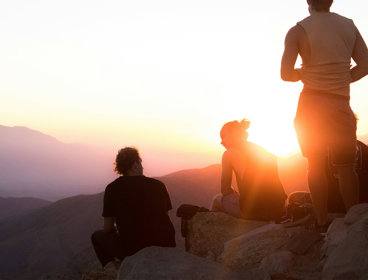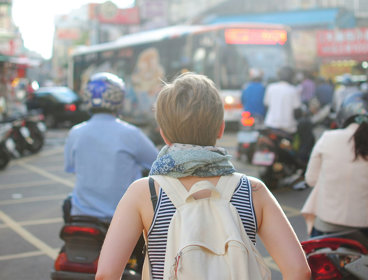Recognising that fieldwork is integral to geographical education and that this will commonly involve travel, this travel and the choice of destination(s) visited should be clearly justified by the relevant module and programme learning outcomes. This justification should balance the environmental costs involved with the geographical learning, transferable skills, development of social and cultural capital and other educational benefits developed through learning within specific environments.
The following list of online resources is dynamic. If you know of other relevant resources you think we should be sharing, we’d be happy to hear from you at rhed@rgs.org
The Society does not accept responsibility for the content of the external sites. Inclusion on this list does not equate to an endorsement of any content or organisation. Please contact the external site for questions regarding individual resources.
Sustainability in higher education
Reducing higher education carbon emissions
Office for Students (UK)
A paper proposing an approach to reducing the higher education sector's Carbon emissions.
Education for sustainable development
Quality Assurance Agency (UK)
Guidance for UK higher education providers (2014).
Responding to climate change in teaching
Alina Congreve and Iain Cross/WONKHE (UK)
The authors examine how education for sustainable development can become a part of teaching in every subject.
Higher Education Sustainability Initiative (HESI)
United Nations
A voluntary, international network of HEIs, committing to teaching and encouraging sustainable development.
Sustainable fieldwork
Getting the most out of fieldwork
Richard Phillips and Jennifer Johns (UK)
A student-targeted chapter from 'Fieldwork for Human Geography' (Sage, 2012).
Does geography have an emissions problem?
Whitney Love and Joe Williams (UK)
A Geography Directions post discussing emissions in HE geography, including the role students should play in discussing climate issues.
Environmental Field and Research Audit
Canterbury Christ Church University (UK)
An assessment framework to help undergraduate students undertaking their dissertations to consider the potential environmental impact of their research.
Carbon footprints and offsetting
The Oxford Principles for net zero aligned carbon offsetting
University of Oxford (UK)
An outline of the role of offsetting in achieving net zero.
Online carbon calculators
Caplor Energy (UK)
An evaluation report on online carbon calculators in the UK.
Trainline carbon calculator
Trainline (UK)
Online tool for calculating carbon emissions from rail travel.
Low carbon travel
UCL (UK)
Advice for staff on sustainable travel.
Seat61.com
Comprehensive guide to international rail travel, including routes from the UK to every European country.
Tools for low-carbon travel
Imperial College London (UK)
A discussion of various travel incentive schemes
Travelling light
World Wide Fund for Nature UK (UK)
Report on greener alternatives for business travellers.
WWF-UK policy position statement on business travel
World Wide Fund for Nature UK (UK)
A paper on the role, modes and impacts of business travel.
Institutional initiatives
Tyndall Travel Strategy
Tyndall Centre for Climate Change Research (UK)
The Tyndall Travel Strategy aims to help support the reduction of emissions through time. It includes a code of conduct, and a system to monitor and justify travel emissions and to support individual commitments to reducing emissions.
Rethinking field trips
London School of Economics (UK)
An exploration of the role of fieldwork in unequal opportunity, unsustainable environment costs and colonial legacies.
Flying Less Concordia
Concordia University (USA)
A 'Flying Less Policy' and other resources from the Department of Geography, Planning and Environment (GPE).
Department of Geography Travel Policy
University of Cambridge (UK)
The Department of Geography's Travel Policy is part of a wider set of actions around reducing its environmental impact.
Selected readings
- Affolderbach, J. (2020) Translating green economy concepts into practice: ideas pitches as learning tools for sustainability education, Journal of Geography in Higher Education. Access the article.
- Anderson, K., and Anderson, P. K. (2014). 5. Slow and low. Beyond Flying: Rethinking air travel in a globally connected world. London, UK: Bloomsbury Publishing.
- Barr, S. and Shaw, G. (2024, March 5). Addicted to flying: why it's so hard to kick this carbon-intensive habit. The Academic. Access the article.
- Cohen, S. A., Higham, j. E., and Cavaliere, C. T. (2011). Binge flying: Behavioural addiction and climate change. Annals of Tourism Research, 38(3), 1070-1089. Access the article.
- Cohen, S. A., and Kantenbacher, j. (2020). Flying less: personal health and environmental cobenefits. Journal of Sustainable Tourism, 28(2), 361-376. Access the article.
- Feliu, J., Inkeroinen, P., Markuszewska, I., Tanskanen, M., Nuss, S. and Vila-Subirós, J. (2019) Defining competences for future geography students in relation to low carbon societies, Journal of Geography in Higher Education, 43:4, pp. 415-430. Access the article.
- Hares, A., Dickinson,j., and Wilkes, K. (2010). Climate change and the air travel decisions of UK tourists. Journal of transport geography, 18(3), 466-473. Access the article.
- Higham, J. and Font, X. (2020) Decarbonising academia: confronting our climate hypocrisy, Journal of Sustainable Tourism, 28:1, pp. 1-9. Access the article.
- Hoolohan, C., McLachlan, C., jones, C., Larkin, A., Birch, C., Mander, S., and Broderick, j. (2021). Responding to the climate emergency: how are UK universities establishing sustainable workplace routines for flying and food?. Climate Policy, 21(7), 853-867. Access the article.
- Latter, B., and Capstick, S. (2021). Climate emergency: UK universities' declarations and their role in responding to climate change. Frontiers in Sustainability, 2, 660596. Access the article.
- McGuinness, M. and Simm, D. (2005) Going Global? Long-Haul Fieldwork in Undergraduate Geography, Journal of Geography in Higher Education, 29:2, pp. 241-253. Access the article.
- Nevins, J., Allen, S., and Watson, M. (2022). A path to decolonization? Reducing air travel and resource consumption in higher education. Travel Behaviour and Society, 26, 231-239. Access the article.
- Nursey-Bray, M., Palmer, R., Meyer-Mclean, B., Wanner, T., and Birzer, C. (2019). The fear of not flying: Achieving sustainable academic plane travel in higher education based on insights from South Australia. Sustainability, 11(9), 2694. Access the article.
- O'Neill, K., and Sinden, C. (2021). Universities, sustainability, and neoliberalism: contradictions of the climate emergency declarations. Politics and Governance, 9(2), 29-40. Access the article.
- Telford, A., Valentine, A., and Godby, S. (2024). The paradox of the 'sustainable fieldtrip'? Exploring the links between geography fieldtrips and environmental sustainability. Journal of Geography in Higher Education, 48(1), 115-132. Access the article.
- Thierry, A., Horn, L., Von Hellermann, P., and Gardner, C. J. (2023, October). "No research on a dead planet": preserving the socio-ecological conditions for academia. In Frontiers in Education (Vol. 8, p. 1237076). Frontiers Media SA. Access the article.
- van der Horst, D., Harrison, C., Staddon, S. and Wood, G. (2016) Improving energy literacy through student-led fieldwork – at home, Journal of Geography in Higher Education, 40:1, pp. 67-76. Access the article.
- Yorke, L., Hutchinson, S., and H urrell, L. (2022C, May 31). 10 ways to make fieldwork more inclusive and accessible: a guide for educators. Access the article.


